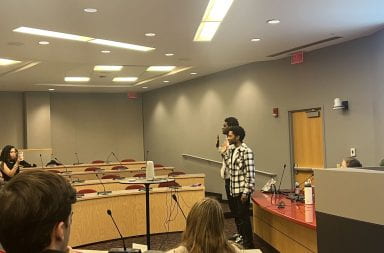A recent Wall Street Journal study found that only 26 percent of psychology graduates are “satisfied” or “very satisfied” in their careers. It was the lowest percentage of 21 majors studied.
But the nearly 1,800 undergraduates pursuing psychology degrees at Ohio State might not need to worry.
“Psychology, being one of the most popular majors nationally, is offered at more places than almost any other major,” said Richard Petty, the Department of Psychology chair, in an e-mail. “Because of this, the quality of the major may not be as high in some places as in others, leading student satisfaction to vary as well.
“The most important thing for OSU students to consider is the quality of the (psychology) major at Ohio State.”
Petty said not only is OSU’s psychology department rated among the top 10 across the nation by the 2010 US News and World Report, but a 2009 graduating senior exit survey conducted by the College of Social and Behavioral Sciences showed 83 percent of psychology majors had a satisfying experience in their degree.
Lauren Bokesch, a fourth-year in psychology and president of Psi Chi, the international honor society in psychology, said the transition from school to work is a reason for post-graduate dissatisfaction.
“I think people are unhappy because they expect to become a psychologist with just a bachelor’s degree, and they don’t know what they are getting into once they declare their major,” Bokesch said. “You have to have at least four years after that, and a lot of people don’t want to go further and just try to find a job with whatever they can.”
In autumn 2007, the Department of Psychology surveyed 1,770 psychology graduates who completed their degrees between spring 2001 and 2006, with a response rate of 21 percent. Responses indicated 64 percent had full-time employment, 10 percent had part-time jobs and 2 percent were unemployed.
Of the respondents, 31 percent pursued a master’s degree, and 27 percent pursued a doctorate or professional degree.
“I think continued education is important in every field, and I think the type of people who major in psychology like to learn and hopefully want to be lifelong learners,” said Eric Shaeffer, a lecturer in the Department of Psychology.
According to the survey, 40 percent of the respondents did not seek a graduate degree.
The survey also indicates that 71 percent of respondents found a job in three months or less, 18 percent found one within three to six months and 11 percent needed more time to secure employment.
Although Shaeffer said he is not sure a graduate degree is necessary for a satisfying career, he thinks students should take advantage of research opportunities, course instruction and professors and peers in the department.
“Maybe the best piece of advice I have is to try and develop a closer connection with faculty members,” he said.
Petty echoed the importance of getting involved during the undergraduate years.
“Getting involved in hands-on research allows undergraduates to see how new psychological knowledge is discovered and allows valuable training in research methods and statistics that is useful regardless of whether the student is going directly into the work force or to graduate school,” he said.
Shaeffer said he does not necessarily agree with the Wall Street Journal study’s results because information is not available about how happy respondents would be if they chose another major. He also said if psychology students are unhappy, it is because of their desire to help people in their profession immediately.
“In my experience with undergrads in psychology at Ohio State, I don’t detect that unhappiness in the students while they are here,” he said. “I don’t want to give anyone the impression that they are unhappy people. I think it’s really quite the opposite. They are idealistic people that really want to make a difference.”
Bokesch is satisfied with her university experience.
“I think OSU’s program is fantastic. I really do,” she said. “They are completely up-front with us and they make sure we know what we are getting ourselves into.”
The Wall Street Journal study, conducted by PayScale.com between April and June 2010, consisted of 10,800 respondents who graduated between 1999 and 2010. The project evaluated satisfying and well-paid careers with the potential for future growth.


